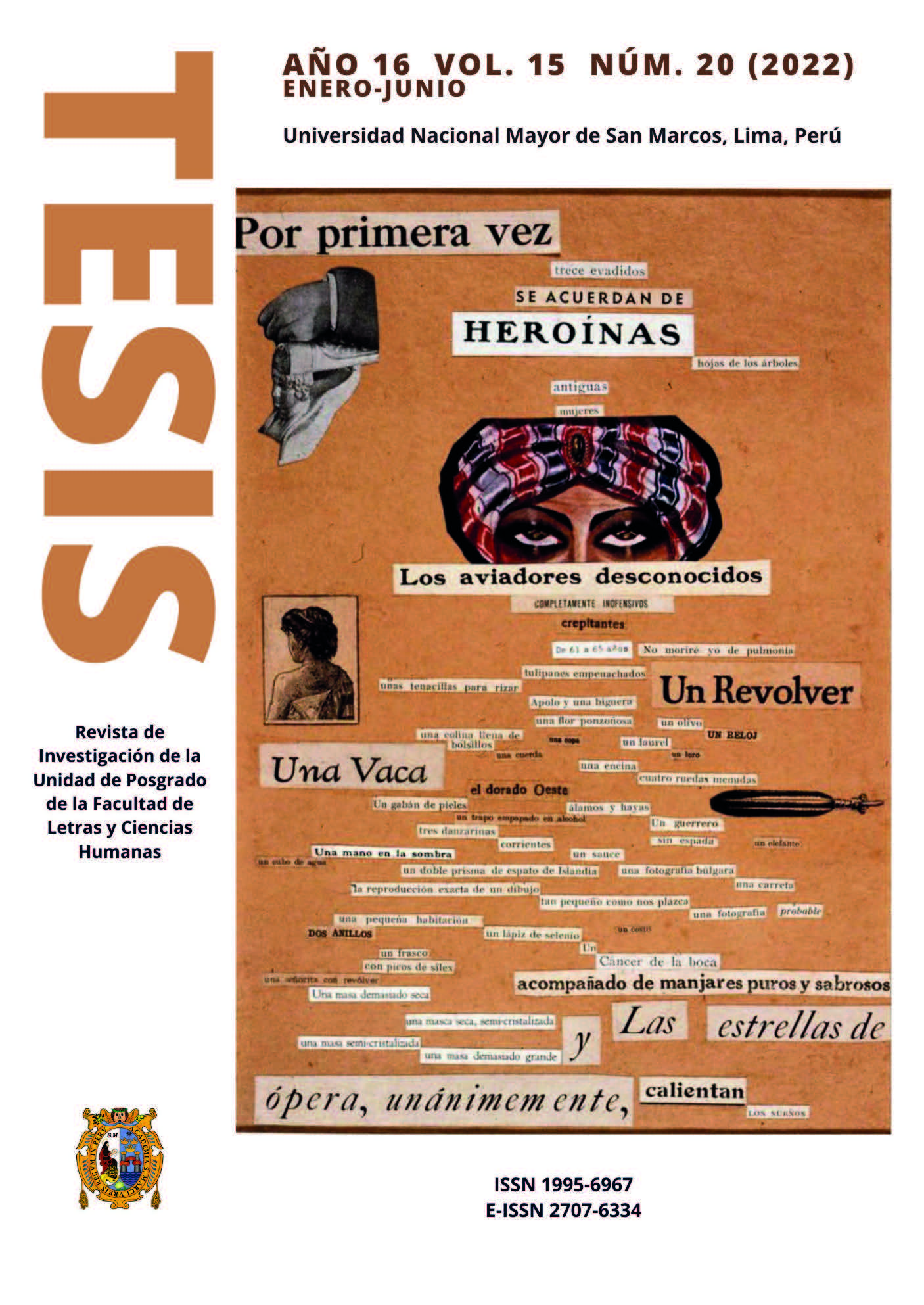Political ideology in two fantastic short stories by Antonio Benítez Rojo
DOI:
https://doi.org/10.15381/tesis.v15i20.23520Keywords:
fantastic narrative, evasive literature, Cuban short story of the XXth century, Antonio Benítez Rojo, Tute de reyesAbstract
This article analyzes the presence of political and ideological elements in two fantastic short stories by the Cuban writer Antonio Benítez Rojo (1931-2005): “Estatuas sepultadas” and “Peligro en La Rampa” (Tute de reyes, 1967). Its purpose is to underline some rhetorical devices by means of which a fantastic fiction can get involved in a political conflict, against the general opinion about the evasive character of this literary genre. Ana Maria Barrenechea’s theory of the fantastic and Boris Uspensky’s theory of the point of view are its theoretical basis concerning the fantastic and the analysis of political and ideological components of a literary work, respectively. As a result, this study shows the presence of politic elements at a thematic level in both narratives and the way its author takes part in favor of the official discourse, despite the subtle manner of masking it through carefully chosen narrative voices.
References
Anónimo. (1967). El Premio [entrevista a Antonio Benítez Rojo sobre Tute de reyes]. Bohemia, 59(10), 12. http://www.bibliotecanacionaldigital.gob.cl/bnd/628/w3-article-255159.html
Avilés Fabila, R. (1981). ¿Es la literatura fantástica un género de evasión? Revista de la Universidad de México, 5-6, 66-70.
Barrenechea, A. M. (1972). Ensayo de una tipología de la literatura fantástica (a propósito de la literatura hispanoamericana). Revista Iberoamericana, 38, 391-403.
Benítez, A. (1967). Tute de reyes. Casa de las Américas.
Bessière, I. (1974). Le récit fantastique. La poétique de l’incertain. Larousse.
Castex, P.-G. (1951). Le conte fantastique en France de Nodier à Maupassant. José Corti.
Chaple, S. (1980). Estudios de literatura cubana. Letras Cubanas.
González Echevarría, R. (1984). Prólogo. En A. Benítez Rojo, Estatuas sepultadas y otros relatos (pp. vii-xxi). Eds. del Norte. https://archive.org/details/estatuassepultad00bena
González Echevarría, R. (2004). Oye mi son: el canon cubano. En A. Birkenmaier y R. González Echevarría (coords.), Cuba: un siglo de literatura (1902-2002) (pp. 19-36). Colibrí. https://archive.org/details/cubaunsiglodelit0000unse
Gregori i Gomis, A. (2015). La dimensión política de lo irreal: el componente ideológico en la narrativa fantástica española y catalana. Cartaphilus, 15, 239-243. https://revistas.um.es/cartaphilus/article/view/316791/223921
Jackson, R. (1981). Fantasy. The literature of subversion. Routledge.
Loyola, H. (11 de septiembre de 1967). Benítez Rojo al trasluz [Entrevista]. El Siglo (Santiago de Chile), 9. http://www.bibliotecanacionaldigital.gob.cl/bnd/628/w3-article-326796.html
Malle, L. (Dir.). (1958). Ascenseur pour l’échafaud [película]. https://archive.org/details/ascenseur-pour-lechafaud-1958-restored-movie-720p-hd
Menton, S. (1978). La narrativa de la Revolución cubana. Playor. https://archive.org/details/lanarrativadelar0000ment
Miranda, J. E. (1971). Nueva literatura cubana. Taurus.
Poe, E. A. (1965). The complete tales and poems. The Modern Library.
Rigol, I. y Rojas, A. (2012). La Rampa. Nostalgia y rescate. En Conservación patrimonial: teoría y crítica (pp. 181-191). Editorial UH.
Rodríguez Feo, J. (1967). Breve recuento de la narrativa cubana. Unión, 4, 131-136.
Rojas, R. (8 de octubre de 2018). Benítez Rojo en su laboratorio. Rialta Magazine. https://rialta.org/benitez-rojo-en-su-laboratorio
Sardiñas, J. M. (2000). El orden alterno en algunas teorías de lo fantástico y en el cuento cubano de la Revolución. Signos Literarios y Lingüísticos, 2, 141-152.
Todorov, T. (1970). Introduction à la littérature fantastique. Editions du Seuil.
Uspensky, B. (1983). A poetics of composition. The structure of the artistic text and typology of compositional form. University of California Press. https://archive.org/details/poeticsofcomposi0000uspe/page/10/mode/2up?view=theater
Vax, L. (1974). L’art et la littérature fantastiques. [4.ª ed.]. Presses universitaires de France.
Ortega, J. (1973). Los cuentos de Antonio Benítez. En E. Pupo-Walker (ed.), El cuento hispanoamericano ante la crítica (pp. 264-278). Castalia. https://archive.org/details/elcuentohispanoa00pupo
Downloads
Published
Issue
Section
License
Copyright (c) 2022 José Miguel Sardiñas Fernández

This work is licensed under a Creative Commons Attribution 4.0 International License.
THE AUTHORS RETAIN THEIR RIGHTS:
(a) The authors retain their trademark and patent rights, and also on any process or procedure described in the article.
(b) The authors retain the right to share, copy, distribute, execute and publicly communicate the article published in Tesis (Lima) (in example, depositing the article in an institutional repository or publish it in a book), with recognition of its initial publication in the Tesis (Lima).
(c) The authors retain the right to make a later publication of their work, to use the article or any part of it (for example: a compilation of their works, notes for conferences, thesis, or for a book), provided that they indicate the source of publication (authors of the work, magazine, volume, number and date).






